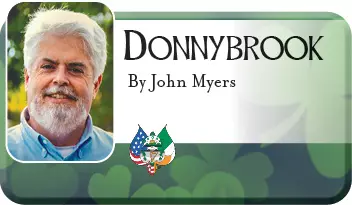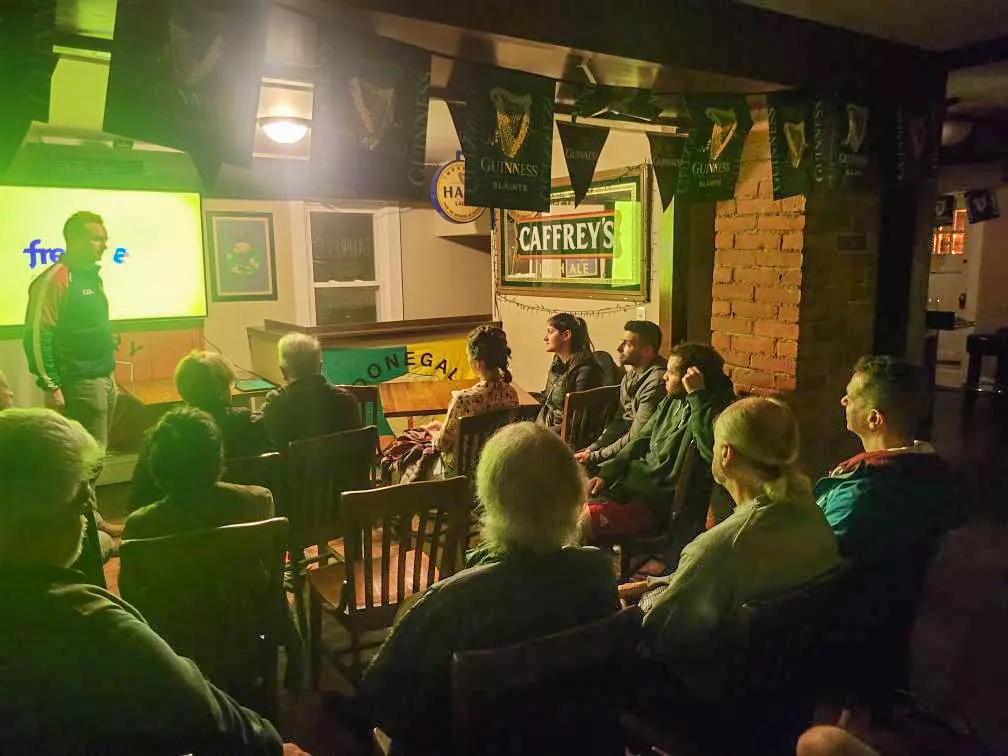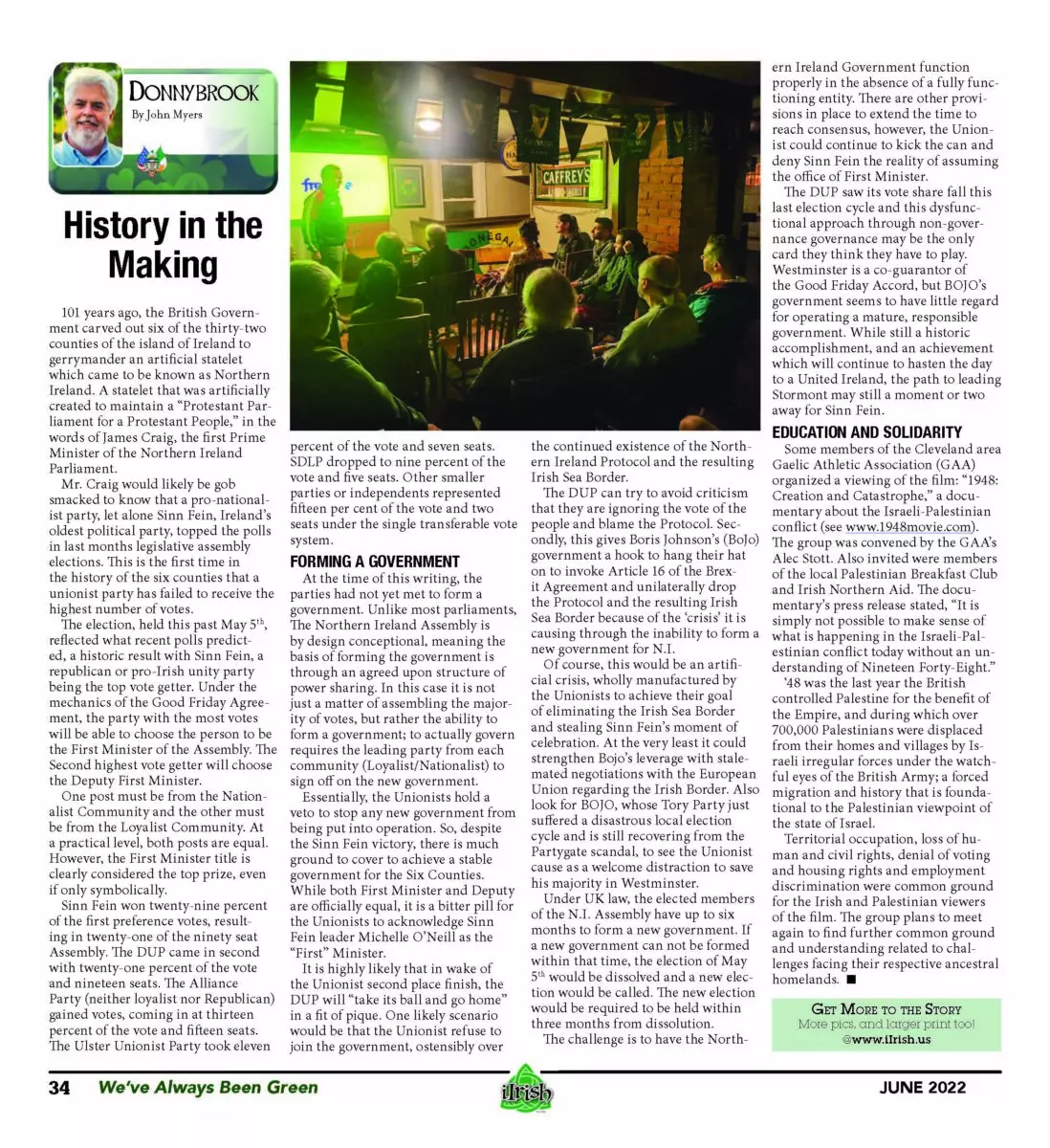
Donnybrook: History in the Making
By John Myers
Sinn Fein Tops Polls
101 years ago, the British Government carved out six of the thirty-two counties of the island of Ireland to gerrymander an artificial statelet which came to be known as Northern Ireland. A statelet that was artificially created to maintain a “Protestant Parliament for a Protestant People,” in the words of James Craig, the first Prime Minister of the Northern Ireland Parliament.
Mr. Craig would likely be gob smacked to know that a pro-nationalist party, let alone Sinn Fein, Ireland’s oldest political party, topped the polls in last months legislative assembly elections. This is the first time in the history of the six counties that a unionist party has failed to receive the highest number of votes.
The election, held this past May 5th, reflected what recent polls predicted, a historic result with Sinn Fein, a republican or pro-Irish unity party being the top vote getter. Under the mechanics of the Good Friday Agreement, the party with the most votes will be able to choose the person to be the First Minister of the Assembly. The Second highest vote getter will choose the Deputy First Minister.
One post must be from the Nationalist Community and the other must be from the Loyalist Community. At a practical level, both posts are equal. However, the First Minister title is clearly considered the top prize, even if only symbolically.
Sinn Fein won twenty-nine percent of the first preference votes, resulting in twenty-one of the ninety seat Assembly. The DUP came in second with twenty-one percent of the vote and nineteen seats. The Alliance Party (neither loyalist nor Republican) gained votes, coming in at thirteen percent of the vote and fifteen seats. The Ulster Unionist Party took eleven percent of the vote and seven seats. SDLP dropped to nine percent of the vote and five seats. Other smaller parties or independents represented fifteen per cent of the vote and two seats under the single transferable vote system.
Forming a Government
At the time of this writing, the parties had not yet met to form a government. Unlike most parliaments, The Northern Ireland Assembly is by design conceptional, meaning the basis of forming the government is through an agreed upon structure of power sharing. In this case it is not just a matter of assembling the majority of votes, but rather the ability to form a government; to actually govern requires the leading party from each community (Loyalist/Nationalist) to sign off on the new government.
Essentially, the Unionists hold a veto to stop any new government from being put into operation. So, despite the Sinn Fein victory, there is much ground to cover to achieve a stable government for the Six Counties. While both First Minister and Deputy are officially equal, it is a bitter pill for the Unionists to acknowledge Sinn Fein leader Michelle O’Neill as the “First” Minister.
It is highly likely that in wake of the Unionist second place finish, the DUP will “take its ball and go home” in a fit of pique. One likely scenario would be that the Unionist refuse to join the government, ostensibly over the continued existence of the Northern Ireland Protocol and the resulting Irish Sea Border.
The DUP can try to avoid criticism that they are ignoring the vote of the people and blame the Protocol. Secondly, this gives Boris Johnson’s (BoJo) government a hook to hang their hat on to invoke Article 16 of the Brexit Agreement and unilaterally drop the Protocol and the resulting Irish Sea Border because of the ‘crisis’ it is causing through the inability to form a new government for N.I.
Of course, this would be an artificial crisis, wholly manufactured by the Unionists to achieve their goal of eliminating the Irish Sea Border and stealing Sinn Fein’s moment of celebration. At the very least it could strengthen Bojo’s leverage with stalemated negotiations with the European Union regarding the Irish Border. Also look for BOJO, whose Tory Party just suffered a disastrous local election cycle and is still recovering from the Partygate scandal, to see the Unionist cause as a welcome distraction to save his majority in Westminster.
Under UK law, the elected members of the N.I. Assembly have up to six months to form a new government. If a new government can not be formed within that time, the election of May 5th would be dissolved and a new election would be called. The new election would be required to be held within three months from dissolution.
The challenge is to have the Northern Ireland Government function properly in the absence of a fully functioning entity. There are other provisions in place to extend the time to reach consensus, however, the Unionist could continue to kick the can and deny Sinn Fein the reality of assuming the office of First Minister.
The DUP saw its vote share fall this last election cycle and this dysfunctional approach through non-governance governance may be the only card they think they have to play. Westminster is a co-guarantor of the Good Friday Accord, but BOJO’s government seems to have little regard for operating a mature, responsible government. While still a historic accomplishment, and an achievement which will continue to hasten the day to a United Ireland, the path to leading Stormont may still a moment or two away for Sinn Fein.

Education and Solidarity
Some members of the Cleveland area Gaelic Athletic Association (GAA) organized a viewing of the film: “1948: Creation and Catastrophe,” a documentary about the Israeli-Palestinian conflict (see www.1948movie.com). The group was convened by the GAA’s Alec Stott. Also invited were members of the local Palestinian Breakfast Club and Irish Northern Aid. The documentary’s press release stated, “It is simply not possible to make sense of what is happening in the Israeli-Palestinian conflict today without an understanding of Nineteen Forty-Eight.”
‘48 was the last year the British controlled Palestine for the benefit of the Empire, and during which over 700,000 Palestinians were displaced from their homes and villages by Israeli irregular forces under the watchful eyes of the British Army; a forced migration and history that is foundational to the Palestinian viewpoint of the state of Israel.
Territorial occupation, loss of human and civil rights, denial of voting and housing rights and employment discrimination were common ground for the Irish and Palestinian viewers of the film. The group plans to meet again to find further common ground and understanding related to challenges facing their respective ancestral homelands.





